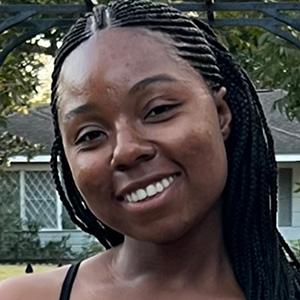Work by Kamaria Shepherd

- Kamaria Shepherd, M.F.A. in Image Text, 2025
Hometown
Houston, TexasWebsite
Kamaria Shepherd
I am related to my southern African American family. I am also related to Grapeland, Texas. Grapeland is always mentioned, thought about, referenced, and understood even when not spoken. We know the place, that place, the place of our family's birth wailing like a newborn being removed from slavery and risen by freedom, religion, tradition, and land ownership; but hurt by the Klan's white-sheeted grip. I've been told the stories are not all told and most are too painful to speak. I repeat what I know, as I am the youngest full-blooded Grapeland descendant amongst many cousins and lines of familial blood. It stops with me.
My ancestral spirit awakens this Grapeland legacy within my art practice as I am determined to give voice to a very specific group of Black Americans who live in the South, speak with a twang, and vote Democrat within a country that believes most Texans to be white Republicans. But we are present. The popularized perception of a Texan is a specific kind of white Texan. We are invisible.
The popularized perception of an American is a specific kind of white American. We are invisible.
My goal is to speak to my audience, those open to the Black American experience whether by tribe or by interest, by speaking a language of African Americans, as I believe art to be a more innate expression and communication of concepts through an understood intellectual language.
I make paintings, prints, photographs, installations, sculptures, and poems that mediate within the space of being a Black woman in and out of the U.S. As I mediate between art forms, I am also mediating within versions of myself, which serve to create work that is concurrently some form of self-portrait or self-portraits. I make fabric from a painting, or photograph and paint it again, making another version or virgin. It is a way of reexploring the historical and the black experience through time. I am a timeline. I take selfies. I am a documentation of selves or selfies from one day or year or generation to the next. I use the selfie to challenge how Black women are represented and how Black women then choose to represent themselves in society. I purposefully crop my pictures at my neckline so as to not show my body and question the viewer's idea of what the rest of me looks like. Do I look like Nicki Minaj? Is how I look variable or decided and by whom? Has this always been? How I am experiencing what my grandmother experienced and how not? What is variable and what is constant? What will change and what will not? Through language and mark I form my own language of understanding identity by removing rank within creating as I make a painting from a photograph, a photograph from a painting, or a poem from a painting and a painting from a poem. I work to provoke questions and instability around the ways black women are marked, understood, and portrayed.
Kamaria Shepherd



